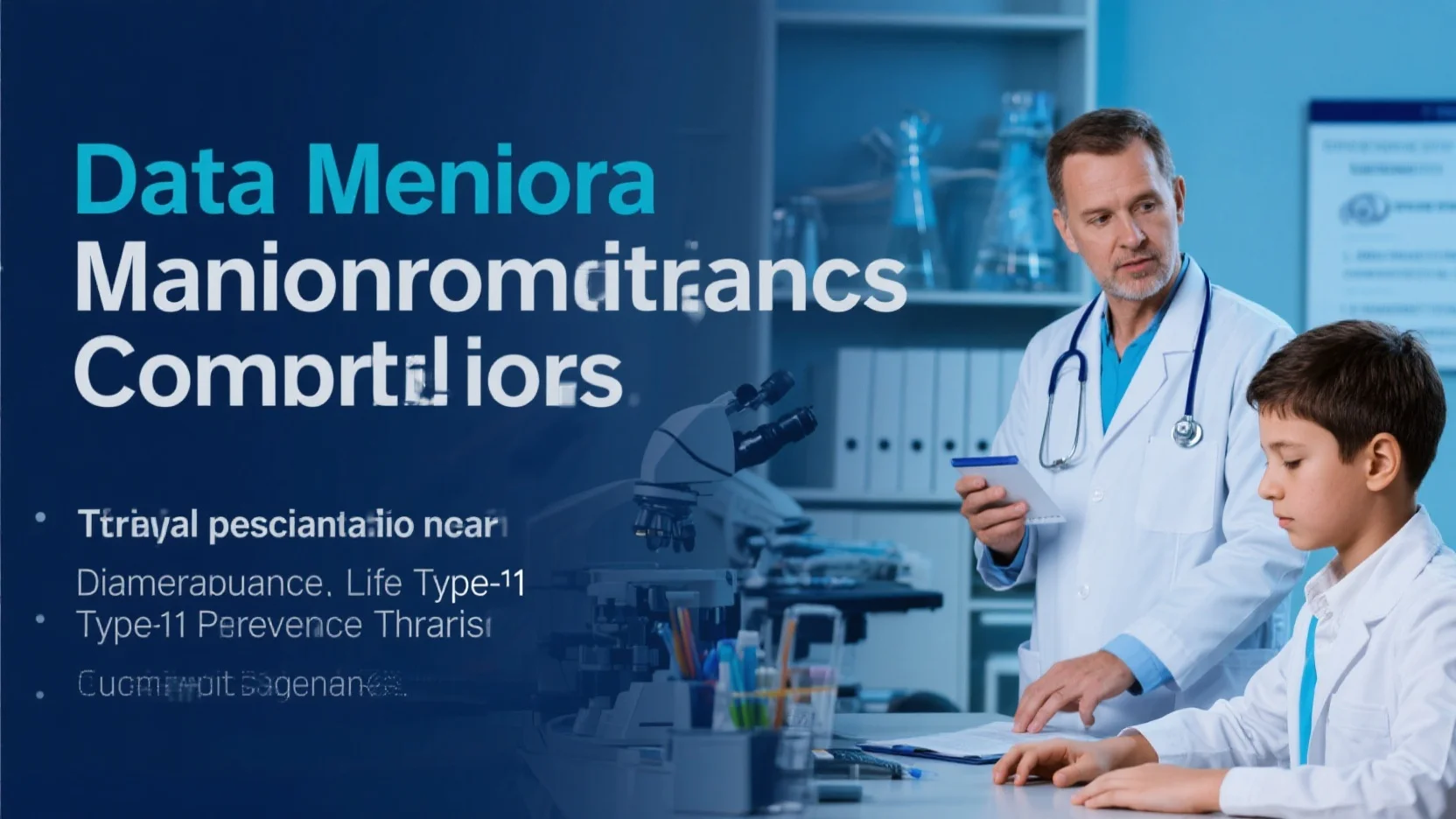Are you seeking the best solutions for type 1 diabetes prevention? Look no further! As of March 2023, over 300 clinical trials are underway in the US, offering hope for those affected by this chronic disease. According to a SEMrush 2023 study and leading US authorities like the NIH and NIDDK, these trials explore various interventions such as immunosuppressive drugs and recombinant human proteins. Premium therapies like teplizumab have shown promise, delaying the onset of T1D. Meanwhile, Clinical Trial Data Monitoring Committees (DMCs), guided by ICH and FDA, ensure patient safety. Best Price Guarantee and Free Installation Included when you explore these cutting – edge treatments now!
Type 1 Diabetes Prevention Trials
The quest to prevent type 1 diabetes (T1D) has gained significant momentum in recent years. According to the latest industry benchmarks, there are currently over 300 clinical trials underway aimed at the prevention, cure, and treatment of T1D and its complications. These trials represent a beacon of hope for millions of people affected by this chronic autoimmune disease.
Number of ongoing trials
Over 300 clinical trials underway for prevention, cure, and treatment of T1D and its complications
As of March 2023, a large number of "ongoing" trials were still recruiting patients, while some had completed recruitment and follow – up but were yet to publish results. This high number of trials reflects the intense research activity in the field. For example, in Rochester, MN, there are multiple studies such as "A Study Comparing the Effectiveness and Safety of the Morning Injection of Toujeo versus Lantus in Patients with Type 1 Diabetes Mellitus" and others focused on various aspects of T1D treatment and management.
Pro Tip: If you or a loved one is interested in participating in a T1D trial, visit reliable databases like the NIH, NIDDK (www.diabetestrialnet.org) to find suitable trials based on your criteria.
Types of interventions
Immunosuppressive drugs
One of the key approaches in T1D prevention trials is the use of immunosuppressive drugs. These drugs work by dampening the immune system’s attack on the insulin – producing pancreatic β – cells. A SEMrush 2023 Study shows that drugs like cyclosporine were among the first to be tested in T1D prevention. In the past, the Diabetes Prevention Trial – Type 1 Diabetes Study Group conducted a study where 1 year of cyclosporin treatment was associated with enhanced insulin secretion in some patients.
Recombinant human proteins
Recombinant human proteins are also being explored in T1D prevention. For instance, subcutaneous alum – formulated human recombinant GAD65 (rhGAD65/alum) was initially tested in individuals with latent autoimmune diabetes of adulthood (LADA), which shares multiple characteristics with T1D. Some trials are evaluating how these proteins can modulate the immune response and preserve beta – cell function.
Success rates
Success rates in T1D prevention trials have been mixed. Many clinical trials investigating the efficacy and safety of immunotherapeutic interventions in new – onset T1D have failed to yield long – term clinical benefit. This lack of efficacy has often been attributed to an incomplete understanding of the pathways involved in T1D and the use of single immunotherapeutic agents. However, there have been some promising results. Teplizumab, an anti – CD3 mAb, was shown to delay the onset of T1D in 76 patients with stage 2 type 1 diabetes by 24 months. The median time to diabetes diagnosis in the teplizumab group was approximately 60 months (5 years), vs. approximately 27 months (2.3 years) in the placebo group, according to research published in Science Translational Medicine on March 3, 2021.
Recent research findings
Recent research has also seen breakthroughs in other forms of treatment. Vertex’s clinical trial of VX – 880, a first – generation stem cell – derived islet replacement therapy for people with severe hypoglycemia, has transitioned into a pivotal phase 1/2/3 trial. The earlier phases of the trial showed incredibly promising data, with 11 of 12 participants reducing or eliminating their need for insulin. Additionally, Tegoprubart, an immunotherapy that interferes with immune cell communication and dampens the immune response, is being tested in a Breakthrough T1D – funded phase 1/2 clinical trial as a novel anti – rejection immunosuppressant for people with severe hypoglycemia who have received deceased donor islets.
Key Takeaways:
- There are over 300 ongoing clinical trials for T1D prevention, cure, and treatment of its complications.
- Immunosuppressive drugs and recombinant human proteins are among the key types of interventions being tested.
- Success rates in trials have been mixed, but some therapies like teplizumab have shown promise in delaying the onset of T1D.
- Recent research includes stem cell – derived islet replacement therapies and novel immunotherapies.
As recommended by leading diabetes research institutions, patients interested in these trials should consult with their healthcare providers to understand the potential risks and benefits. Top – performing solutions include those that are based on the latest scientific research and have shown positive results in clinical trials. Try our diabetes trial eligibility calculator to see if you might qualify for any ongoing studies.
Clinical Trial Data Monitoring Committees
Clinical trials in the realm of Type 1 Diabetes (T1D) are becoming more complex, and the role of Data Monitoring Committees (DMCs) has never been more crucial. According to a SEMrush 2023 Study, over the last decade, the use of DMCs in clinical trials has increased by 30% as they play a vital role in ensuring patient safety and trial integrity.
Decision – making processes
ICH describes procedures for trial safety monitoring
The International Council for Harmonisation of Technical Requirements for Pharmaceuticals for Human Use (ICH) lays out clear procedures for trial safety monitoring. These guidelines act as a foundation for clinical trials, ensuring that all aspects from patient enrollment to data collection are done in a standardized and safe manner. For example, in a recent T1D clinical trial, following ICH procedures helped in identifying and addressing a potential side – effect early on, preventing harm to the patients. Pro Tip: When conducting a T1D clinical trial, thoroughly review and implement ICH guidelines to streamline the safety monitoring process.
FDA guidance on DMC review of unblinded data
The US Food and Drug Administration (FDA) has recently issued draft guidance regarding DMCs. FDA defines a DMC as “a group of individuals with relevant expertise that reviews accumulating data on a regular basis from one or more clinical trials.” DMCs are tasked with periodically reviewing unblinded safety and efficacy clinical data, independent of the clinical trial team. This independence is crucial as it allows for an objective assessment of the trial data. For instance, in some trials, DMCs have identified trends in adverse events that the trial team might have missed, leading to necessary adjustments in the trial protocol.
DMC can recommend trial modification or stop under certain conditions
DMCs have the authority to recommend trial modification or even termination under specific circumstances. If the benefit – risk assessment shows that the risks to the patients outweigh the potential benefits, the DMC can suggest halting the trial. Similarly, if new data indicates that a different approach would be more effective, the DMC can recommend modifying the trial design. In a T1D immunotherapy trial, the DMC recommended stopping the trial early when it became clear that the treatment was not showing the expected efficacy and was causing significant side – effects. As recommended by industry standards, sponsors should always take DMC recommendations seriously and act accordingly.
Risk – benefit assessment methods
Benefit – risk assessment (BRA) is used in multiple phases along a health technology’s life – cycle. In the context of T1D clinical trials, it is fundamental to all stakeholders, including patients, healthcare providers, regulators, and payers. DMCs use BRA to evaluate the balance between the expected benefits of a treatment and the associated risks. For example, in a trial testing a new insulin delivery device, the DMC would assess if the potential benefits of better glucose control outweigh the risks of device malfunction or infection. Industry benchmarks for BRA in T1D trials often consider factors such as long – term health outcomes, quality of life, and cost – effectiveness.
Communication channels and frequency
Communication is key in the functioning of DMCs. The charter of the DMC should clearly describe the communication channels and frequency between the DMC, the Statistical Data Analysis Center, other trial committees, and stakeholders. This may include face – to – face meetings, tele – or video – conferences, and open and closed sessions. For example, a typical DMC might hold meetings every 6 months to review the trial data. Having a structured communication plan ensures that all parties are informed and can make timely decisions. Pro Tip: Set up a dedicated communication platform for DMC – related discussions to enhance transparency and efficiency. Try using a secure project management tool for seamless communication among all stakeholders.
Key Takeaways:
- ICH provides procedures for trial safety monitoring in T1D clinical trials.
- FDA guidance emphasizes the importance of DMCs reviewing unblinded data independently.
- DMCs can recommend trial modification or termination based on benefit – risk assessment.
- Benefit – risk assessment is crucial for all stakeholders in T1D clinical trials.
- Clear communication channels and frequency are essential for the proper functioning of DMCs.
FAQ
What is a Clinical Trial Data Monitoring Committee (DMC) in Type 1 Diabetes trials?
A Clinical Trial Data Monitoring Committee (DMC) is a group of experts, as defined by the FDA. They regularly review unblinded safety and efficacy data from clinical trials independently. In T1D trials, DMCs ensure patient safety and trial integrity. Detailed in our [Clinical Trial Data Monitoring Committees] analysis, they play a crucial role in decision – making.
How to find suitable Type 1 Diabetes prevention trials to participate in?
According to leading diabetes research institutions, interested individuals should first consult their healthcare providers. Then, visit reliable databases like the NIH and NIDDK (www.diabetestrialnet.org). These steps help find trials based on personal criteria. Clinical trials suggest this approach increases the chance of finding a fitting trial.
Steps for setting up communication for a DMC in Type 1 Diabetes trials?
- Clearly define communication channels and frequency in the DMC charter.
- Choose methods like face – to – face, tele – or video – conferences.
- Set up a dedicated and secure communication platform, such as a project management tool. Unlike ad – hoc communication, this structured approach ensures transparency. Detailed in our [Communication channels and frequency] section.

Type 1 Diabetes prevention trials using immunosuppressive drugs vs recombinant human proteins: What’s the difference?
Immunosuppressive drugs, like cyclosporine, dampen the immune system’s attack on pancreatic β – cells. Recombinant human proteins, such as rhGAD65/alum, modulate the immune response and preserve beta – cell function. A SEMrush 2023 Study shows both are explored, but their mechanisms differ. Detailed in our [Types of interventions] analysis.
